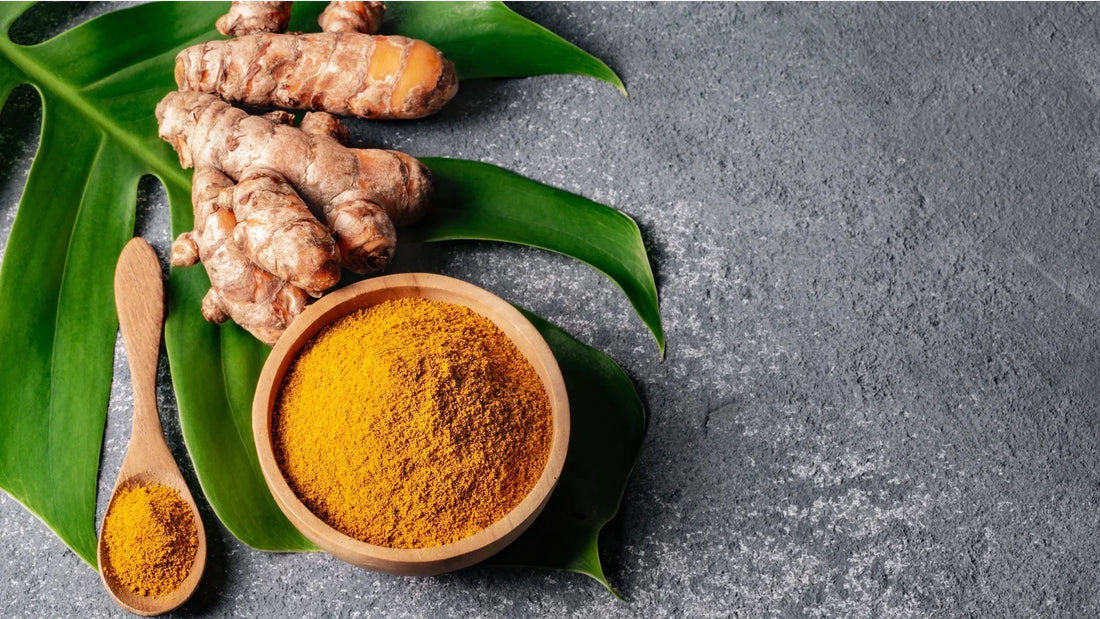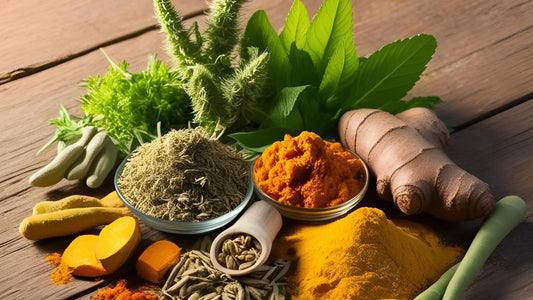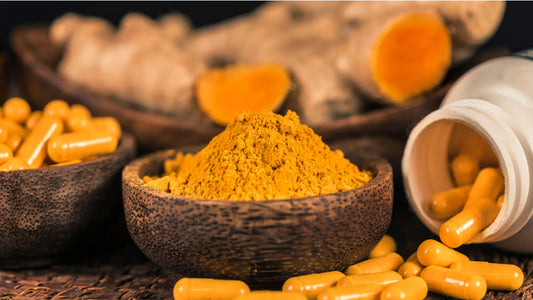
Supporting a Healthy Lifestyle: How Turmeric and Curcumin Extract Promote Vitality
Introduction:
The wise have said, "Take care of your body, it's the only place you have to live."! Staying at the top of our health enhances mental well-being, boosts energy levels, and contributes to a longer lifespan. Prioritizing health leads to a richer and more vibrant existence. Embracing a healthy lifestyle reduces the risk of chronic diseases like heart disease, stroke, cancer, and diabetes. Wellness and fitness involve being aware and making healthy choices about diet, exercise, and staying positive. This is the most important investment you can make in your life. Eating a healthy diet is all about feeling great, having more energy, improving your health, and boosting your mood. Good nutrition, physical activity, and healthy body weight are essential parts of a person’s overall health and well-being. Therefore, Embracing a Healthy Lifestyle is the key to Physical and Mental Resilience.
Numerous avenues exist for staying well and enhancing our well-being, with embracing natural supplements being one such path. Turmeric (Curcuma longa) is a plant in the ginger family that has been used in traditional Indian medicine for centuries. It is known as haridra in Sanskrit. Curcumin was first isolated in the early 1900s. There is a growing body of scientific research that supports curcumin benefits for our health. Turmeric and curcumin can be taken in a variety of forms, including capsules, powders, and extracts.
In this blog, apart from learning about the medicinal value of turmeric, we discover the remarkable properties of these natural wonders and how they can positively impact our overall health and vitality
Table of Contents:
1. The Basics - Understanding Turmeric and Curcumin Extract
2. Historical Significance and Traditional Applications of Turmeric
3. The Healing Power of Turmeric and Curcumin
4. Incorporating Turmeric and Curcumin Extract into Your Daily Regimen
5. Recommended Dosages
6. Methods of consumption
7. Safety Considerations and Possible Side Effects
8. Combining Turmeric with Healthy Lifestyle Practices
9. Quick Recap & the Benefits of Curcumin Tablets by Gencleus
10. Final thoughts & parting advice.
The Basics - Understanding Turmeric and Curcumin Extract
Turmeric comes from the root of Curcuma longa, a flowering plant of the ginger family native to Southeast Asia. Turmeric has a bright yellow color and a slightly bitter taste. It is often used in curry powders and other Indian dishes. Turmeric contains many plant substances, but one group, curcuminoids, has the greatest health-promoting effects. Curcumin is a naturally-occurring chemical compound found in turmeric. It is the most active and most beneficial to health among curcuminoids. Curcumin is known for its anti-inflammatory, anti-tumour and antioxidant effects. The main difference between turmeric and curcumin extract is the concentration of curcumin. Turmeric contains about 3% curcumin, while curcumin extract can contain up to 95% curcumin. This means that curcumin extract is much more potent than turmeric. Curcumin extraction is more complicated than turmeric extraction.
Historical Significance and Traditional Applications of Turmeric:
Turmeric has been used for thousands of years as a spice, dye, and medicine in various Asian cultures. Turmeric was used in ancient Egypt, Greece, and Rome as well as by the Mayans and Aztecs in Central America. It is also known as “Indian saffron” and has many names in Sanskrit, such as Haridra, meaning what Vishnu wears. Turmeric is a key ingredient in Indian cuisine, especially curry, and is revered by Hindus as a sacred and benedictory material. In ancient times it was used as a perfume as well as a spice. Turmeric was employed as a household remedy for minor cuts, wounds, and insect bites due to its antimicrobial and antiseptic properties. In Ayurvedic medicine, turmeric was used to strengthen the body’s overall energy and relieve arthritis. Thus turmeric's incredible versatility and countless benefits have deeply rooted it in the tapestry of ancient cultures throughout history.
The Healing Power of Turmeric and Curcumin: Curcumin Benefits
From nurturing joint health and promoting optimal digestion to bolstering the immune system and enhancing cognitive vitality, the profound benefits of these natural wonders exemplify their invaluable contributions to well-being. Let us now explore each of these benefits in detail:
1. Anti-inflammatory properties
Curcumin, the active compound found in turmeric, plays a pivotal role in unlocking numerous health benefits, particularly its potent anti-inflammatory effects. By inhibiting the production of pro-inflammatory molecules like cyclooxygenase-2 (COX-2) and inducible nitric oxide synthase (iNOS), curcumin curtails inflammation. Moreover, it obstructs the activity of enzymes that promote inflammation, further reducing its impact. Scientific research continues to amass, substantiating the anti-inflammatory prowess of turmeric and curcumin. Studies demonstrate their potential in alleviating inflammation associated with conditions such as arthritis, inflammatory bowel disease, and psoriasis. For chronic conditions where inflammation starts to affect tissues in your body, taking turmeric is very beneficial as demonstrated in a study of patients with ulcerative colitis.
2. Anti-oxidant effects
Antioxidants are substances that protect cells from damage caused by free radicals. Free radicals are unstable molecules that can damage cells and contribute to the development of chronic diseases, such as heart disease, cancer, and Alzheimer's disease. Curcumin, a potent antioxidant, safeguards cells by scavenging and preventing damage from free radicals. It also aids in repairing cells already affected by free radicals. Scientific evidence* supports the antioxidant properties of turmeric and curcumin, demonstrating their ability to protect cells through scavenging free radicals, reducing oxidative stress, and repairing damaged cells. With their antioxidant prowess, turmeric and curcumin hold remarkable therapeutic possibilities as natural remedies. Another study suggests that turmeric’s antioxidant effects may also stimulate the action of other antioxidants.
3. Support for brain health and cognitive function
Curcumin, a bioactive compound in turmeric, has been shown to have potential benefits for brain health and cognitive function. Curcumin can cross the blood-brain barrier and has the potential to help clear plaques that build up in the brain affected by Alzheimer’s disease. Curcumin benefits include its ability to safeguard mental acuity through its neuroprotective effects. Therefore, turmeric may have the ability to boost memory function, reduce brain fog, and enhance overall cognition. Brain-derived neurotrophic factor (BDNF) is a protein that is essential for the growth and development of new brain cells. Curcumin has been shown to increase BDNF levels in the brain. In one study, people with mild cognitive impairment who took curcumin showed an increase in BDNF levels compared to people with mild cognitive impairment who did not take curcumin. Another clinical trial showed that 90 milligrams of curcumin taken twice a day for 18 months helped improve memory performance in adults without dementia.
4. Potential for managing chronic diseases
Curcumin can suppress pro-inflammatory pathways related to most chronic diseases and block both the production of TNF(Tumor necrosis factor) and the cell signalling mediated by TNF in various types of cells. Curcumin has been shown to be active against various chronic diseases including various types of cancers, diabetes, obesity, cardiovascular, pulmonary, neurological and autoimmune diseases.
5. Arthritis:
Turmeric and curcumin have been shown to be effective in reducing pain and inflammation in people with arthritis.
6. Inflammatory bowel disease:
Turmeric and curcumin may help to reduce inflammation in people with inflammatory bowel disease, such as Crohn's disease and ulcerative colitis.
7. Cancer:
Turmeric and curcumin may help to reduce inflammation and promote cancer cell death. However, more research is needed to confirm these effects.
8. Heart disease:
Turmeric and curcumin may help to reduce cholesterol levels and inflammation, which are two risk factors for heart disease.
9. Type 2 diabetes:
Improving insulin sensitivity and control of blood sugar levels, which are two important factors in managing type 2 diabetes are amongst the benefits of curcumin.
10. Boosting Immune Function
Turmeric and curcumin is found to boost immune function by inhibiting the production of pro-inflammatory cytokines, reducing inflammation and improving immune response. They can also boost the production of anti-inflammatory cytokines, promoting healing and protecting cells from damage. It can activate natural killer cells, enhancing the body's ability to combat infections, and increase the production of antibodies, providing added protection against infections. Research* indicates that curcumin has the potential to enhance antibody response, a crucial aspect of the immune system responsible for recognizing and eliminating pathogens. By supporting the production of antibodies, curcumin may strengthen the body's defense mechanisms against infections. Maintaining a balanced gut microbiota is essential for optimal immune function. Curcumin has demonstrated positive impacts on gut health by promoting microbiota balance, reducing inflammation in the gut, and supporting the integrity of the gut barrier. These factors collectively contribute to the overall health of the immune system.
11. Digestive health benefits
Maintenance of robust digestive health are among the benefits of curcumin and turmeric. They have traditionally been used to alleviate digestive discomfort such as bloating, gas, and indigestion by potentially stimulating the production of digestive enzymes for improved digestion. Curcumin may also provide protection against gastric ulcers caused by factors like stress, alcohol, or NSAIDs, as it can inhibit the growth of Helicobacter pylori bacteria commonly associated with ulcers. Additionally, turmeric and curcumin have been associated with supporting liver health, aiding in liver detoxification and its important role in digestion, including bile production, nutrient metabolism, and toxin filtration.
Incorporating Turmeric and Curcumin Extract into Your Daily Regimen
Now that we've explored the potential turmeric and curcumin benefits in detail, let's examine practical ways to incorporate them into our daily routine.
Tips for selecting high-quality turmeric and curcumin extract supplements
-
Look for a standardized extract:Standardization refers to the process of testing and guaranteeing the presence of a specific amount of curcumin in a product. This helps in repeating fully the curcuminoids benefits It is typically expressed as a percentage. For instance, a supplement standardized to 95% curcumin signifies that it contains 95% curcumin and 5% other ingredients. This ensures consistency and allows consumers to make informed choices about the curcumin content in the supplement they are considering.
-
Go completely organic: Opting for supplements made wholly using organic turmeric is the most authentic way to experience its benefits. Choosing organic ensures that the turmeric is grown without synthetic pesticides, fertilizers, or genetically modified organisms (GMOs), preserving its natural qualities and minimizing exposure to potentially harmful substances. By selecting organic turmeric, you can have greater confidence in receiving the full benefit.
- Choose a supplement which has undergone Third-party testing: Independent lab testing confirms the safety and efficacy of the curcumin extract supplement. This process involves subjecting the supplement to rigorous examination and analysis by a third-party laboratory to validate its quality, purity, and adherence to established standards. By undergoing independent lab testing, the curcumin extract supplement provides assurance of its safety and effectiveness.
Recommended Dosages
The recommended dosage of curcumin extract varies depending on the individual and the specific condition being treated. Generally, a dosage range of 500-2,000 mg of curcumin per day is suggested. It is important to enhance curcumin absorption by taking it with a fatty meal or a supplement containing piperine. Clinical trials have investigated specific dosages for various conditions. For osteoarthritis, 1,500 mg per day has shown effectiveness in reducing pain and improving function. In rheumatoid arthritis, 800 mg per day has demonstrated benefits. A dosage of 1,000 mg per day has been effective in reducing symptoms of depression, while 400 mg per day has shown cognitive improvement in individuals with Alzheimer's disease. (Source https://www.drugs.com/npp/turmeric.html) However be informed that while curcumin supplements are generally considered safe for use, it is crucial to consult with a healthcare professional before incorporating any new dietary supplement into your routine. This is particularly important if you have underlying medical conditions, are pregnant or breastfeeding, or are taking medications. By seeking guidance from your healthcare provider, you can receive personalized advice tailored to your specific health needs, ensuring optimal safety and efficacy.
Methods of consumption
To maximize turmeric and curcumin benefits, there are various methods of consumption that can be explored.
-
Adding turmeric to recipes: Incorporating turmeric into your recipes offers versatility and a chance to enjoy its benefits. Whether you're preparing curries, soups, stews, or rice dishes, adding turmeric can enhance the flavour and provide potential health benefits. Turmeric Milk, Turmeric Roasted Vegetables curry, Turmeric Lentil Soup & Turmeric Quinoa Salad are a few examples. To maximize the curcumin content, it is recommended to use fresh turmeric root powder, as the powdered form typically has lower levels of curcumin. Experimenting with turmeric in various recipes allows you to explore different flavors while incorporating this beneficial spice into your diet.
-
Preparing turmeric tea: Is a simple and enjoyable method to incorporate curcumin into your routine. To make turmeric tea, steep turmeric root powder in hot water for 5-10 minutes. For added flavor and benefits, consider adding other spices like ginger, cinnamon, or black pepper to your turmeric tea blend. This delightful beverage offers a convenient way to consume curcumin and enjoy its potential health benefits.
-
Preparing a turmeric paste: by combining turmeric powder with either water or oil. This versatile paste can serve as a flavorful condiment or be incorporated into curries, soups, marinades, and other dishes to add a vibrant touch of turmeric goodness.
-
Incorporating turmeric supplements:
into your routine offers a concentrated form of turmeric for added convenience. Available in capsules, tablets, or extracts, these supplements provide a convenient way to benefit from turmeric's potential health properties. However, it is important to consult with a healthcare professional to determine the appropriate dosage and ensure the quality of the supplements you choose.
Safety Considerations and Possible Side Effects
Being informed about potential side effects and seeking medical advice will help ensure safe and appropriate usage of turmeric and curcumin supplements. Common side effects of turmeric and curcumin include upset stomach, which is usually mild and self-limiting, as well as occasional mild diarrhoea. Some individuals may experience infrequent nausea or headache. Skin rash is a rare side effect, but if it occurs, it's recommended to discontinue use and consult a healthcare professional. Consult your healthcare provider if you are pregnant, breastfeeding, have known allergies, or take medications such as blood thinners or diabetes medications before considering turmeric or curcumin supplements. These groups may require special attention due to limited research on the effects of turmeric and curcumin in these situations and the potential for interactions with certain medications.
Combining Turmeric with Healthy Lifestyle Practices
It is crucial to state that combining turmeric with other healthy lifestyle practices, such as regular exercise and a balanced diet, is essential for optimizing overall well-being. While turmeric and curcumin offer a host of health benefits as seen now in detail, they are not definitely not a substitute for a healthy lifestyle. Engaging in physical activity, maintaining a balanced diet rich in fruits, vegetables, whole grains, and lean proteins, and practising stress management techniques are all integral components of a 360-degree approach to wellness. By incorporating turmeric into a broader healthy lifestyle regimen, you can harness its potential benefits more effectively and promote long-term health and vitality. Always remember that cultivating a comprehensive and balanced lifestyle is paramount for attaining and sustaining optimal health.
Quick Recap & the Benefits of Curcumin Tablets by Gencleus
We have seen thoroughly that Curcumin, a potent extract derived from turmeric, is recognized as a natural healer with a multitude of health benefits. Scientific research has revealed over 600 proven health benefits, showcasing its incredible potential for the body. Unlike many turmeric supplements, Curcumin tablets by Gencleus contain an impressive 96% curcumin, providing a medicinal dose of curcuminoids and utilizing proven delivery technology for optimal absorption, maximising its potency. This unique offering supports various aspects of health, including smooth skin, sharp vision, flexible joints, enhanced heart and lung function, boosted brain power, and support for blood pressure and blood vessel health. Its anti-inflammatory properties aid in alleviating joint pain and stiffness, while the comprehensive formula extends benefits to cardiovascular and cognitive health. Incorporating Curcumin tablets into your routine can unlock these extensive benefits and promote overall wellness.
Final thoughts & parting advice:
In the wake of the pandemic, it's completely understandable that health concerns have been heightened. However, we encourage you to view this as an opportunity to embrace natural remedies, such as turmeric, and incorporate them into a healthy lifestyle. Traditional sciences like Ayurveda have stood the test of time and have been successfully used by people across geographies for millennia. These remedies offer a wealth of wisdom and have proven beneficial for countless individuals throughout history. Incorporating natural remedies into your routine doesn't have to be a daunting task. Harness the medicinal value of turmeric. Start small by integrating turmeric into your cooking, trying out turmeric tea or milk, or exploring curcumin supplements. These simple steps can yield profound benefits for your body and overall well-being. By embracing natural remedies, you are embracing the wisdom of ancient practices that have helped generations before us. Let this be a journey of self-care and empowerment. What is the difference between turmeric and curcumin extract? Turmeric comes from the root of the Curcuma longa plant and contains about 3% curcumin, while curcumin extract can contain up to 95% curcumin. Curcumin is the most active and beneficial compound found in turmeric, known for its anti-inflammatory, anti-tumor, and antioxidant effects. What are the benefits of turmeric and curcumin? Turmeric and curcumin offer numerous health benefits, including:
- Anti-inflammatory properties: Curcumin helps reduce inflammation associated with conditions like arthritis and inflammatory bowel disease.
- Antioxidant effects: Curcumin acts as an antioxidant, protecting cells from damage caused by free radicals.
- Brain health and cognitive function: Curcumin may enhance memory, cognitive function, and protect against neurodegenerative diseases like Alzheimer's.
- Potential for managing chronic diseases: Curcumin has shown promise in managing conditions like cancer, heart disease, type 2 diabetes, and more.
- Boosting immune function: Turmeric and curcumin can enhance the immune system's response to infections and promote healing.
- Digestive health benefits: Turmeric and curcumin can support digestion, alleviate digestive discomfort, and promote liver health.
How can I incorporate turmeric and curcumin into my daily routine?
There are several ways to incorporate turmeric and curcumin:
- Add turmeric to recipes: Use turmeric powder in curries, soups, stews, rice dishes, or experiment with turmeric in various recipes.
- Prepare turmeric tea: Steep turmeric root powder in hot water and add other spices like ginger or cinnamon for added flavor and benefits.
- Make a turmeric paste: Mix turmeric powder with water or oil to create a paste that can be used as a condiment or added to various dishes.
- Consider turmeric supplements: Consult with a healthcare professional for appropriate dosage and choose high-quality turmeric supplements in capsules, tablets, or extracts.
Are there any safety considerations or side effects of turmeric and curcumin? Turmeric and curcumin supplements are generally considered safe, but some individuals may experience mild side effects such as upset stomach, diarrhea, nausea, headache, or rare cases of skin rash. Pregnant or breastfeeding women, individuals with allergies, or those taking medications should consult with a healthcare professional before using turmeric or curcumin supplements to ensure safety and avoid potential interactions.



